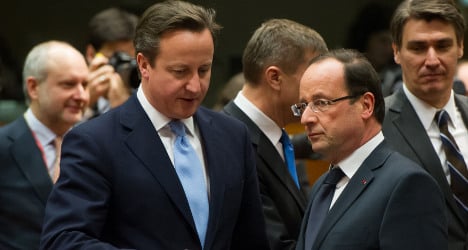British Prime Minister David Cameron has cancelled his scheduled visits to Paris and Berlin this week, and cut short his ongoing visit to Madrid, following the death of former British Prime Minister Margaret Thatcher.
"Yes he is cutting short his trip. He's returning from Madrid, he's expected back later today," a Downing St spokesman told AFP.
Cameron had been expected to press his case for reform of the European Union ahead of a referendum on his own country's membership of the bloc.
Before leaving for the trip on Monday he said he expected the 27-nation grouping would have to submit to treaty change despite top EU officials previously saying there was no appetite for it.
Before Monday afternoon's cancellation, Cameron had been set to discuss the civil war in Syria during planned talks with Spanish premier Mariano Rajoy, French President François Hollande and German Chancellor Angela Merkel, his office said.
His tour began early on Monday with his first official visit to Madrid since taking office in 2010, but Cameron cut short the remainder of his European tour, including a working dinner with Hollande, which had been set to take place in Paris on Monday evening.
Cameron had also been preparing to visit Berlin at the end of the week for "further discussions about taking forward his (EU) reform agenda," Downing Street said.
Cameron sent shockwaves through the EU in January when he set out plans to wrest back powers from Brussels and to then put Britain's reshaped membership to an in-out referendum by the end of 2017.
In an interview with five European newspapers being published on Monday, Cameron called on the EU to bring in "change that all of Europe can benefit from".
"We are a major European power, a major European player. But do we think that the European Union has sometimes overreached itself with directives and interventions and interferences? Yes, it has. And that needs to change," he said.
"I think this organisation is ripe for reform. I think we're in a global race where we have to compete with (countries like) India, China, Indonesia and Malaysia," he said.
He cited the agreement by EU leaders in February to cut its 2014-2020 budget as an example of recent reformist moves by the bloc.
Cameron also told the journalists from France's Le Monde, Germany's Sueddeutsche Zeitung , Italy's Il Sole 24 Ore, Spain's El Mundo and Poland's Gazeta Wyborcza that he believed alterations to the EU's treaties would also be likely.
EU president Herman van Rompuy warned in February there was no appetite among EU leaders for any major treaty change, insisting the focus in coming years would be on shoring up the eurozone — the 17 countries that use the single currency that Britain is not part of.
But Cameron insisted: "I think there will be treaty change."
"The eurozone in my view needs to have further treaty change, and just as eurozone countries will argue that it's necessary to have treaty change, I think it's perfectly legitimate to argue that non-eurozone countries might need to have treaty changes that suit them," he added.
The British premier had also been ready to discuss Syria with the three EU leaders and was "keen to find ways to advance a political solution and to up the pressure on (President Bashar al-) Assad to make him realize there is no military solution," Downing Street said.
Cameron had also been expected to discuss his priorities this year for the G8 group of industrialized nations, of which Britain holds the rotating chairmanship, including EU-US trade, tackling tax avoidance and greater transparency, Downing Street said.
Britain hosts a meeting of G8 foreign ministers this week.



 Please whitelist us to continue reading.
Please whitelist us to continue reading.
Member comments